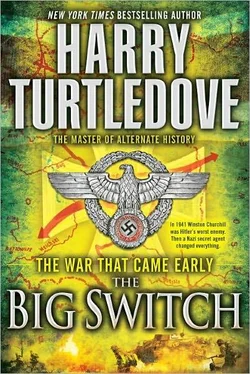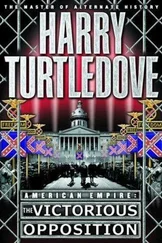Harry Turtledove - The Big Switch
Здесь есть возможность читать онлайн «Harry Turtledove - The Big Switch» весь текст электронной книги совершенно бесплатно (целиком полную версию без сокращений). В некоторых случаях можно слушать аудио, скачать через торрент в формате fb2 и присутствует краткое содержание. Жанр: Альтернативная история, на английском языке. Описание произведения, (предисловие) а так же отзывы посетителей доступны на портале библиотеки ЛибКат.
- Название:The Big Switch
- Автор:
- Жанр:
- Год:неизвестен
- ISBN:нет данных
- Рейтинг книги:3 / 5. Голосов: 1
-
Избранное:Добавить в избранное
- Отзывы:
-
Ваша оценка:
- 60
- 1
- 2
- 3
- 4
- 5
The Big Switch: краткое содержание, описание и аннотация
Предлагаем к чтению аннотацию, описание, краткое содержание или предисловие (зависит от того, что написал сам автор книги «The Big Switch»). Если вы не нашли необходимую информацию о книге — напишите в комментариях, мы постараемся отыскать её.
The Big Switch — читать онлайн бесплатно полную книгу (весь текст) целиком
Ниже представлен текст книги, разбитый по страницам. Система сохранения места последней прочитанной страницы, позволяет с удобством читать онлайн бесплатно книгу «The Big Switch», без необходимости каждый раз заново искать на чём Вы остановились. Поставьте закладку, и сможете в любой момент перейти на страницу, на которой закончили чтение.
Интервал:
Закладка:
“Everything clear behind us, Albert?” he asked through the brass speaking tube.
“If it weren’t, I’d be screaming my head off.” Sergeant Albert Dieselhorst was rear gunner and radioman. He and Rudel sat back-to-back, separated by an armored bulkhead. If anyone had a better understanding than Hans-Ulrich of how limited the Stuka was in the air, Dieselhorst was the man.
The Ivans were masters of camouflage. Whitewash and concealment under trees or white cloth could make it hard to spot a panzer on the ground at a hundred meters, let alone from several thousand up in the air. But not even the Russians could hide the long shadows panzers cast on the snow. “There they are!” Hans-Ulrich yipped excitedly.
“Go get ’em, Lieutenant,” Dieselhorst said. It was all news to him. Like Epimetheus in the Greek myth, he could see only where he’d already been.
Hans-Ulrich heeled the Ju-87 into a dive. He hung suspended against his harness for a moment. Then building acceleration shoved him back into his seat. It would be trying to tear the rear gunner from his and throw him out of the plane over his machine gun.
Down on the ground, the panzers swelled from specks to toys to real, deadly whitewashed machines. He dove from behind. When he struck, he fired a round from each gun at the engine compartment. The steel on the decking there was thin, and pierced to let heat escape. He hauled back on the stick as hard as he could to pull the Stuka out of the dive.
“Nailed him!” Sergeant Dieselhorst yelled through the tube. “He’s on fire!”
“Good.” Hans-Ulrich climbed as steeply as he could. He picked another camouflaged panzer and dove on it. Two more rounds. Another burning machine, or so the rear gunner assured him. Some of the crewmen on the other panzers popped out of hatches to blaze away at the Ju-87 with pistols and submachine guns, but Rudel wouldn’t lose any sleep over that. Small-arms fire could bring down an airplane, but it didn’t happen every day, or every month, either.
He blasted three more Russian panzers. The rest started up and skedaddled for the nearest trees. Then Dieselhorst said, “I’m getting reports of planes in the neighborhood.”
“All right. We’ll go home.” Hans-Ulrich had heard the reports in his earphones, too. He hadn’t wanted to do anything about that. Sometimes discretion was the better part of valor, though. He could gas up again and hit the Ivans on a stretch of front where they didn’t have any air cover.
A flak shell burst under the Stuka, staggering it in the sky. No, the Russians didn’t want him around anymore. He gave the plane more throttle. If they’d got set up a little sooner, they might have knocked him down. Not now.
“Just another morning at the office,” Sergeant Dieselhorst said.
“Aber naturlich.” Hans-Ulrich laughed. Why not? Just another day at the office, sure-and they’d lived through it.
Sergeant Hideki Fujita had thought winter in the Siberian forests was about as bad as anything could be. It was worse than winter on the border with Mongolia, which made it pretty appalling. But winter in front of Vladivostok turned out to be worse yet. It was as cold as the rest of Siberia, with the same wet, heavy snowfall. But it was out in the open-nowhere to hide from the relentlessly probing Russian artillery.
The Red Army was always ass-deep in guns. Russian artillerymen had harried the Japanese on the frontier between Manchukuo and Mongolia. They’d fused their shells to burst as soon as they touched the treetops in the woods, showering Japanese forces astride the Trans-Siberian Railway with deadly fragments. And, here in front of their Far Eastern port, they tried to murder anything that moved.
They came much too close to succeeding. Kilometer upon kilometer of barbed wire and entrenchments ringed Vladivostok. The Soviet Union had always known it might have to fight for the place one day. If Japan was going to take it, her soldiers would have to winkle out the Red Army men one foxhole at a time.
More than a generation earlier, the fight for Port Arthur had gone the same way. Some of the men commanding at Vladivostok would have been junior officers in the earlier fight. Fujita hoped they’d learned something in the intervening years. By everything he could see, it didn’t seem likely.
He mostly huddled in a dugout scraped from the forward wall of a trench. Digging was anything but easy. The ground was frozen hard as stone. It wouldn’t collapse under shellfire, which was something. Not enough, not as far as Fujita was concerned.
Japanese and Russian cannon dueled with one another. Machine guns made sticking your head up over the parapet tantamount to committing seppuku. Runners who brought rice and other food up from the field kitchens risked their life with every trip. Even when they made it through, meals were commonly cold by the time they reached the frontline soldiers.
Rumors flew thick and fast as bullets. Some people said the Russian commander was about to surrender, the way the nobleman in charge of Port Arthur had in 1905. Fujita didn’t believe that one. He’d spent too long fighting the Russians to doubt they were in earnest. They might bungle things-they weren’t always skillful soldiers. But, no matter what they’d been like in 1905, no one who fought them now could think they’d quit so easily.
Other rumors claimed the Japanese would soon charge the works in front of them again. Fujita had to hope those weren’t true. Too many frozen corpses still sprawled suspended in the wire ahead. Along with solidifying the ground, the cold meant dead bodies didn’t stink. Having said those two things, you exhausted its virtues.
Fujita wanted the generals to come up with something brilliant, or at least clever. If they tried something like that, he was less likely to get killed or maimed than if they just pounded away. They didn’t seem to worry about that. As far as generals were concerned, soldiers were only munitions of war, expendable as machine-gun bullets or 105mm shells.
Far off in the distance, Vladivostok itself burned. Black columns of smoke rose into the sky all day long. Japanese bombers pounded the city night and day. When, as occasionally happened, the wind blew from the south instead of the north, the half-spicy, half-choking smell of smoke filled Fujita’s nostrils.
Russian fighters rarely came up to challenge the Japanese planes. The Reds hadn’t had many fighters when Fujita got here, and they had fewer now. Fighters were short-range planes; the Soviet Union couldn’t bring in more very easily.
Russian bombers, by contrast, flew over fairly often, for the most part at night. Fujita had no idea where they came from. Some landing strip up in Siberia? The northern, Soviet half of the island Japan called Karafuto and the Russians Sakhalin? No doubt it mattered to his superiors, who had to decide what to do about the air raids. To Fujita, they were only one more annoyance. Machine-gun bullets and the deadly artillery were worse.
And worse still was knowing his regiment was only an officer’s whim from being thrown into the fire of a frontal attack. Many went forward. Few came back-even fewer unmaimed.
Shinjiro Hayashi, a superior private in Fujita’s section, had been a student when conscription nabbed him. He still had a calculating turn of mind. “If we use up a regiment to take a stretch of ground two hundred meters wide and fifty meters deep, how many will we use to advance twenty kilometers on a front at least fifty kilometers around?” he asked.
When Fujita was in school, he’d hated problems like that. He tried to work this one, but didn’t like the answer he got. “I don’t know if there are that many regiments in Japan,” he said.
“I don’t, either, Sergeant- san,” Hayashi answered somberly.
Читать дальшеИнтервал:
Закладка:
Похожие книги на «The Big Switch»
Представляем Вашему вниманию похожие книги на «The Big Switch» списком для выбора. Мы отобрали схожую по названию и смыслу литературу в надежде предоставить читателям больше вариантов отыскать новые, интересные, ещё непрочитанные произведения.
Обсуждение, отзывы о книге «The Big Switch» и просто собственные мнения читателей. Оставьте ваши комментарии, напишите, что Вы думаете о произведении, его смысле или главных героях. Укажите что конкретно понравилось, а что нет, и почему Вы так считаете.












